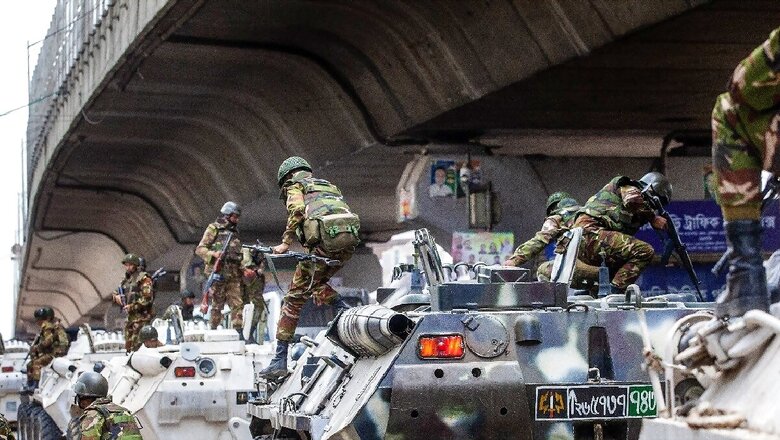
views
A Bangladeshi student group whose demonstrations against civil service hiring rules precipitated serious nationwide unrest said Sunday it would not abandon protests despite a Supreme Court ruling partially meeting their demands.
“We won’t call off our protests until the government issues an order reflecting our demands,” a spokesman for Students Against Discrimination told AFP on condition of anonymity.
Bangladesh’s top court on Sunday pared back contentious civil service hiring rules but failed to mollify university student leaders, whose demonstrations against the scheme sparked nationwide clashes that have killed 151 people.
Ruling on an appeal, the Supreme Court ordered that the veterans’ quota be cut to 5%, with 93% of jobs to be allocated on merit. The remaining 2% will be set aside for members of ethnic minorities and transgender and disabled people.
What began as a protest against politicised admission quotas for sought-after government jobs snowballed this week into some of the worst unrest of Prime Minister Sheikh Hasina’s tenure.
Soldiers are patrolling cities across Bangladesh after riot police failed to restore order, while a nationwide internet blackout since Thursday has drastically restricted the flow of information to the outside world.
The Supreme Court was due to decide next month on the legality of the recently reintroduced scheme that reserves more than half of government jobs for select applicants, but brought forward its verdict as the civil strife intensified.
Opponents accuse Hasina’s government of bending the judiciary to its will, and the premier had already hinted to the public this week that the court would issue a ruling favourable to student demands.
Students, frustrated by shortages of good jobs, have been demanding an end to a quota that reserved 30% of government jobs for relatives of veterans who fought in Bangladesh’s war of independence in 1971. The government previously halted it in 2018 following mass student protests, but in June, Bangladesh’s High Court reinstated the quotas and set off a new round of protests.
Hasina, 76, has ruled the country since 2009 and won her fourth consecutive election in January after a vote without genuine opposition.
Her government is accused by rights groups of misusing state institutions to entrench its hold on power and stamp out dissent, including by the extrajudicial killing of opposition activists.
“It’s not about the rights of the students anymore,” business owner Hasibul Sheikh, 24, told AFP at the scene of a Saturday street protest, held in the capital Dhaka in defiance of a nationwide curfew.
“Our demand is one point now, and that’s the resignation of the government.”
The protests turned deadly on Tuesday, a day after students at Dhaka University began clashing with police. Violence continued to escalate as police fired tear gas and rubber bullets and hurled smoke grenades to scatter stone-throwing protesters.
Bangladeshi authorities haven’t shared any official numbers of those killed and injured, but at least four local newspapers on Sunday reported that over 100 people have been killed.
An Associated Press reporter on Friday saw security forces fire rubber bullets and tear gas at a crowd of more than 1,000 protesters who had gathered outside the head office of state-run Bangladesh Television, which was attacked and set on fire by protesters the previous day. The incident left streets littered with bullets and marked by smears of blood.


















Comments
0 comment